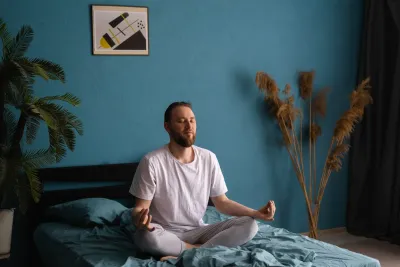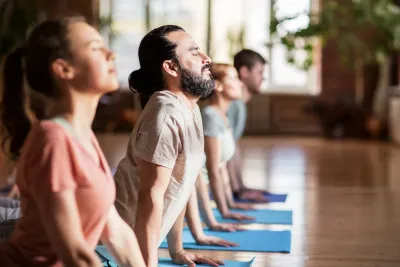How to Wake Up Energized: 11 Tips for Better Mornings
Ana Marie Schick: Resident Sleep Expert and Certified Health Coach • Jan 25, 2024

Key Takeaways
Feeling more energized in the morning starts with improving sleep quality, supporting your circadian rhythm, and building simple, consistent habits that help your body wake up naturally.
- Morning fatigue is commonly caused by sleep inertia, poor sleep quality, dehydration, inconsistent schedules, and late-night habits that disrupt deep and REM sleep.
- Simple morning strategies—like skipping the snooze button, drinking water right after waking, getting natural sunlight, and moving your body—can quickly boost alertness and energy.
- Optimizing your sleep routine is critical: consistent bedtimes, a cool and dark bedroom, and limiting screens before bed all support deeper, more restorative sleep.
- A holistic approach works best. Practices like mindfulness, light exercise, balanced breakfasts, journaling, or even cold exposure can improve mental clarity and sustained morning vitality.
Waking up in the morning can be daunting for many of us. We often experience mornings when we feel like we just can't wake up. People often ask themselves, "Why can't I wake up, and why don't I have energy in the morning?"
The reasons behind being tired in the morning can vary from person to person. It can be due to a lack of quality sleep, misaligned work hours with our natural circadian rhythm, mood disorders, or even dehydration.
Sleep inertia is a term that refers to the groggy, disoriented, and/or impaired performance state that one experiences upon waking up, and it can last from minutes to hours. [1]
In other words, it's the sluggish feeling you experience after you wake up, making it challenging to start your day on the right foot. [2]
To combat this sluggish feeling, some people may resort to loading up on coffee or energy drinks, but this approach can lead to feelings of jitteriness, anxiety, and dependence on caffeine for energy.
So, how do you wake up with more energy? It's not that difficult if you put effort into getting quality sleep, staying hydrated, and developing a consistent sleep schedule to ensure that you start your day feeling refreshed and energized.

1. How Hitting Snooze Is an Issue
Hitting the snooze button on your alarm clock or phone may not be as beneficial as you'd like it to be. We've all been there: mornings where you hit the snooze repeatedly, hoping that you'll feel more rested and ready to get out of bed the next time the alarm goes off.
Unfortunately, this is rarely the case.
Scientists believe that sleep must be uninterrupted for some minimum period of time **(e.g., 60-90 minutes for a complete sleep cycle) ** for it to be restorative. After the alarm rings and you hit snooze to fall back asleep for less than that time, you enter what scientists call “fragmented sleep.”
Alarm Clock Study: A research study found that spending 30 minutes or so in fragmented sleep between alarms can impair our daytime function. [3] That extra fragmented sleep actually may make you worse off for the rest of the day.
So, even if you've become habituated to hitting the snooze button before waking up, you should stop. Instead, take time to re-evaluate your sleep-wake routine. The morning fog might be your body alerting you of its need for more sleep time.
Instead, try setting your alarm for a realistic time you think you'll be able to wake up. Or, if you still want to stick with the snooze button, try setting your first alarm 90 minutes before your second one.
This will give you a complete sleep cycle between your two alarms, allowing you to wake up after your REM sleep.
Did You Know? The University of Notre Dame researchers studied the snooze button habit and discovered that the majority of people (57%) tend to hit snooze. [4]

Wake Up Refreshed & Energized: Shop Sale
Give yourself or someone you love the gift of deeper sleep and more energized mornings. Shop now and save on smarter, cooler sleep with the Chilipad cooling mattress topper. Easily heat or cool your mattress between 55°F and 115°F.

2. Drink Plenty of Water
Drinking cold water first thing in the morning will help you jumpstart your day. If you feel fatigued in the morning, you may be dehydrated. Think about it! You likely just spent 8 to 10 hours without drinking anything.
Even mild dehydration can disrupt your mood, cause sleepiness, and/or negatively affect your cognitive ability. Therefore, keep a glass of water by your bed. As soon as you wake up in the morning, you can drink some water to start to feel better as soon as possible [5]
Remember, it's best to continue drinking cold water throughout the day, which is crucial for maintaining physical and mental well-being. Adequate hydration provides that your body functions efficiently, aiding in digestion, nutrient absorption, and detoxification.
It's important to keep energy levels up and support cognitive functions like working memory and concentration. Staying hydrated also enhances physical performance, prevents cramps, and helps regulate body temperature.
3. Get Some Morning Sunlight
Stepping outside and getting some early morning sunlight may help reduce the morning fog. In some research studies, exposure to gradually increasing bright natural light decreased participant sleepiness and improved performance. [6]
Furthermore, sunlight boosts your brain's serotonin levels. Having healthy serotonin levels is an essential part of receiving healthy sleep. If you find yourself inside all day, whether at home or in the office, try going outside to catch some rays. This may improve your sleep and leave you feeling more rested and refreshed the next day.
Can't get outside? Turning on your bright white LED lights can expose your brain to blue light. It stimulates the brain and may help you feel more awake. [7] So try going on a morning walk, opening your curtains, and/or turning on lights to reap the benefits.

4. Get Moving; Morning Exercise
Low-intensity exercise or strenuous exercise may be the last thing on your mind when you're lying in bed trying to talk yourself into getting up, but researchers say a short bout of exercise in the morning may help you feel more energized. [8] In particular, cardio and regular exercise play a role in significantly reducing fatigue [9] during the day and help you sleep better at night.
Sleep Study: A 2019 study found that morning exercise improves visual learning, decision-making, and visual learning.[10]
Additionally, a 2021 study compared the effects of high-intensity, low-intensity, and no exercise on sleep inertia. The study found that high-intensity exercise reduced sleep inertia the most. [11]

5. Meditation and Yoga Enhance Your Daily Life
Another way to feel more energized in the morning is to get moving! Contemplative activities like focused attention (i.e. breathing exercises) and open monitoring (e.g., meditation), improve circulation and raise oxygen levels. This stimulation can help the body fight off fatigue, making you feel more awake and alert.
After you wake up, try practicing guided meditation while taking long, deep breaths to start your day. You can go for a short walk and pray or do some stretching by the bedside.
These practices may stimulate your brain, as well as reduce stress and improve your next sleep! [12]
Study: Breathing exercises can stimulate the body. [13]
Perform Yoga in the Morning
Give yourself some time in the morning to stretch or perform yoga exercises, as they can support healthy brain function and increase energy levels. Did you know that while you're in at night, certain muscles are paralyzed, while others move involuntarily?
Reactivating our muscles in the morning with yoga or simple stretches can release endorphins, which boost energy levels.
6. Morning Journaling
In addition to meditation, there are additional mindfulness practices that can significantly enrich your morning routine and set a positive tone for the day. Journaling, for instance, provides a reflective space to clarify thoughts, emotions, and intentions, fostering a sense of calm and focus.
Starting the day by jotting down your gratitude can shift your perspective to one of abundance and positivity, effectively reducing stress and enhancing overall well-being.
These gratitude practices, alongside regular meditation, cultivate an awareness and appreciation for the present moment, anchoring you in a state of mindfulness that carries through the day.
Combining these items into your morning can transform your daily outlook, paving the way for a more centered, peaceful, and fulfilling life.

7. Eat a Balanced Breakfast
If you feel tired in the mornings and find yourself rushing out the door to get to work on time, then chances are you'll be skipping breakfast or only eating a little bit to save time. While this may seem like a good idea, if it means you get to sleep more, this could negatively affect your energy levels throughout the day.
Did You Know: A balanced breakfast is crucial for kick-starting your day with energy, while certain foods can also significantly promote better sleep at night.
However, overeating in the morning can make you feel more sluggish. Therefore, it's essential to find a balance where you feel satisfied but not too full, causing you to feel tired.
Researchers found that missing breakfast can negatively impact your energy and focus throughout the day. [14] You need to provide your body with good fuel to carry you through your day. Try eating healthy and sticking to whole grains, nuts, lean proteins, and low-sugar foods.
8. Take a Cold Shower
Cold showers (temperatures below 70º) are a great way to feel energized in the morning. Cold showers jumpstart your body, and the change in body temperature may reduce any sleepiness lingering in your body after sleep.
Plus, additional cold shower benefits include increasing endorphins, improving metabolism and circulation in your body, and delivering more oxygen to the brain, further fighting off fatigue.
Furthermore, if you're having trouble waking up in the morning because of depression, taking cold showers may benefit you. Researchers suggest cold showers and/or plunging into icy waters may effectively treat depression and higher well-being. [15]

9. Enjoy a Cup of Coffee
Many of us love and regularly drink coffee in the morning! It's the 3rd or 4th cup that can become problematic. We suggest limiting your caffeine intake to 1-2 cups a day before mid-afternoon.
While caffeine may help you initially in the morning, consuming a large amount of caffeine can lead you to crash, forcing your natural energy and levels to go down even further. Caffeine can also cause problems with sleeping later that day! While caffeine seems like a good idea in the morning, it may indirectly contribute to increased fatigue later.
Recently, a study reported [16] that participants felt more tired the day after consuming caffeinated drinks. Try drinking less caffeine in the morning and see if it makes you less tired.
Tip: If you're not a fan of coffee or tea, then you can always grab a glass of water.
10. Practice Good Sleep Hygiene
Finally, practicing good sleep hygiene is essential to feeling more awake in the morning. If you are not getting enough quality sleep every night, this can dramatically reduce your energy the following day.
Therefore, get enough sleep (recommended 7 to 9 hours), practice waking up and going to bed at basically the same time every day, and build a comfortable sleeping environment. Creating a sleep schedule can offer numerous benefits.
Keeping your bedroom cool can play an important role in creating the ideal environment. Sleeping in cooler temperatures makes it easier to fall asleep and stay asleep, whereas feeling hot during the night can keep you up, disturbing your sleep cycle.
Creating a tranquil and conducive sleep environment and optimizing your bedroom for comfort and calmness with the right lighting, temperature, and noise levels are key.
Equally important is managing the role of electronics before bed, as the blue light emitted from screens can significantly disrupt your natural sleep cycle. Instead, consider establishing a pre-sleep ritual involving relaxation techniques such as reading, gentle stretching, or deep breathing exercises to signal to your body that it's time to wind down.
By focusing on these elements, you can enhance the quality of your sleep, leading to more restorative nights and reducing morning fatigue.
Want to ditch the alarm and still wake up feeling refreshed? Don’t miss our new post on how to wake up without an alarm clock, packed with smart strategies to sync with your body’s natural rhythm.

11. Sleep Cooler at Night
If you want to cool down your bed at night to get a comfortable, deep sleep, try using one of our bed cooling systems: Chilipad Dock Pro or the Chilipad Cube Sleep System.
View our award-winning bed cooling systems.
They keep you cool at night to get high-quality sleep and wake up with more energy in the morning.
Why Am I Tired When I Wake Up?
People often feel tired in the morning for several reasons. One primary factor is the lack of quality sleep, which can be due to various issues like stress, an uncomfortable sleep environment, or an inconsistent sleep schedule.
Poor sleep hygiene can disrupt the body's natural sleep-wake cycle, leading to restless nights. Dietary habits also play a role; consuming caffeine or heavy meals late in the evening can interfere with sleep.
Also, underlying health conditions and sleep disorders such as sleep apnea or insomnia can significantly impact the ability to get restorative sleep.
Read More: How to Stop Waking Up Tired and Get Back on Track
Not getting enough physical activity during the day can contribute to a feeling of lethargy in the morning. Addressing these factors is crucial for waking up feeling refreshed and energized.
How Do I Get More Energy in the Morning?
Do you need help to kickstart your day with energy and enthusiasm? You're not alone. Many of us grapple with morning fatigue, making it challenging to get out of bed and tackle the day ahead.
However, there are effective strategies that can transform your mornings, helping you wake up revitalized and ready to tackle the day ahead.
Below, we'll explore various practical and simple ways to boost your energy levels in the morning. From optimizing your bedtime routine to morning exercises, these tips are designed to help you welcome each day with renewed vigor and a positive outlook.
Let's dive into these life-changing habits and say goodbye to sluggish mornings.
When to Speak to a Doctor
If you're finding yourself dragging in the mornings, it might be because you're not getting enough sleep or your body's natural clock is off balance. But, if you've tried fixing your sleep routine and are still feeling worn out, it might be a good idea to chat with your doctor to see what's happening.
Final Thought
Crafting an energizing morning routine is a deeply personal endeavor, and what works for one may not suit another. Design a routine that can fight morning fatigue and that resonates with your lifestyle, preferences, and time constraints, and identify activities that invigorate you.
Are you motivated by a quick jog, a soothing yoga session, or perhaps a creative outlet like painting or writing? Incorporate these elements into your morning, even for a few minutes.
Consider your time realistically; a routine shouldn't add stress but should be a sequence of actions you look forward to each day. For those with tight schedules, small but impactful practices like a five-minute meditation, sipping a cup of herbal tea, or jotting down three things you're grateful for can make a significant difference.
Personalize your routine by aligning it with your long-term goals. If you're aiming to be more mindful, include meditation or journaling. If physical health is your focus, incorporate a short workout or a healthy breakfast.
Remember, consistency is key. Even on rushed mornings, having a simplified version of your routine can help maintain momentum and ensure your day starts on a positive note.
Lastly, be flexible and allow your routine to evolve with you. Regularly assess what's working and what isn't; feel free to adjust accordingly. An energizing morning routine is a self-care ritual that can improve your overall well-being and productivity when tailored to fit your unique life.
Often, it can be challenging to understand why you wake up tired. Before making drastic changes, making a few adjustments over time is recommended, which can help you wake up and feel more energized to conquer the day!
By doing so, you can understand what is working and help you wake up without feeling tired. If nothing appears to be helping, it's best to discuss it with your primary doctor.
Frequently Asked Questions About Morning Energy Boosters
How to Wake up With More Energy?
There are several ways to help you feel more energized in the mornings.
- Create a consistent sleep schedule.
- Limit or avoid caffeine at night.
- Keep meals light and stay away from heavy meals late at night.
- Create a relaxing bedtime routine.
- Get 7-9 hours of quality sleep.
- Exposing yourself to natural light in the morning.
What Are Some Ways to Feel Energized?
First, allow yourself to drink plenty of water throughout the day. Eat a healthy meal with a good mixture of protein and healthy fats. Even a quick walk or light exercise can give you a natural energy boost throughout the day.
Get plenty of sleep each night, and try taking small breaks during the day to stretch or move around, especially if you sit a lot. Plus, manage your stress. Take time out of your day for yourself to relax. This can help you stay energized and focused.
Can Certain Foods Help Boost My Morning Energy?
Yes, eating a balanced breakfast with a mix of protein, healthy fats, and complex carbs can help maintain steady energy levels in the morning. Try to limit or avoid sugary options, which can cause a quick energy crash. When eating a balanced breakfast, some people ask "do eggs give you energy in the morning?
Yes, eggs are a fantastic addition to your breakfast for sustained energy because:
- Protein Powerhouse
- Steady Fuel
- Nutrient Rich
Peer-Reviewed Research References
-
Van Dongen, H. P., & Belenky, G.
Alertness Level.
Encyclopedia of Neuroscience, Springer.
Study Type: Neuroscience Reference Entry
Key Finding: Alertness is strongly influenced by sleep duration, circadian timing, and sleep pressure, with insufficient sleep leading to measurable declines in vigilance, reaction time, and cognitive performance.
View Study
Source URL: https://doi.org/10.1007/978-3-540-29678-2
-
Hilditch, C., & McHill, A. W.
Sleep Inertia: Current Insights.
Nature and Science of Sleep, 2019.
Study Type: Narrative Review
Key Finding: Sleep inertia causes temporary impairments in alertness, reaction speed, and decision-making immediately after waking, particularly when waking from deep sleep or during circadian lows.
View Study
Source URL: https://doi.org/10.2147/NSS.S188911
-
Stepanski, E. J.
The Effect of Sleep Fragmentation on Daytime Function.
Sleep, 2002.
Study Type: Clinical Sleep Study
Key Finding: Fragmented sleep reduces daytime alertness and cognitive efficiency even when total sleep time is preserved, underscoring the importance of uninterrupted sleep.
View Study
Source URL: https://doi.org/10.1093/sleep/25.3.268
-
Sieff, J.
Hitting the Snooze Button? You’re Far from Alone.
Notre Dame News, 2022.
Study Type: Survey & Behavioral Analysis
Key Finding: A majority of adults regularly use the snooze function, a habit associated with repeated sleep inertia and delayed cognitive readiness in the morning.
View Study
Source URL: https://news.nd.edu/news/hitting-the-snooze-button-youre-far-from-alone-study-shows
-
Taylor, K., & Jones, E. B.
Adult Dehydration.
StatPearls, 2021.
Study Type: Clinical Medical Review
Key Finding: Mild dehydration can impair concentration, mood, and energy levels, potentially compounding morning fatigue and reduced alertness after waking.
View Resource
Source URL: https://www.ncbi.nlm.nih.gov/books/NBK555956/
-
Bjorvatn, B., et al.
Effects of Bright Light Treatment on Sleepiness During Night Shifts.
Scandinavian Journal of Work, Environment & Health, 2021.
Study Type: Placebo-Controlled Crossover Study
Key Finding: Bright light exposure significantly reduced subjective and objective sleepiness, improving alertness and performance in shift workers.
View Study
Source URL: https://pmc.ncbi.nlm.nih.gov/articles/PMC8114564/
-
Choi, K., et al.
Awakening Effects of Blue-Enriched Morning Light Exposure.
Scientific Reports, 2018.
Study Type: Experimental Light Exposure Study
Key Finding: Blue-enriched light exposure after waking enhanced physiological arousal and subjective alertness in university students.
View Study
Source URL: https://doi.org/10.1038/s41598-018-36791-5
-
Gerritsen, R. J., & Band, G. P.
Breath of Life: The Respiratory Vagal Stimulation Model.
Frontiers in Human Neuroscience, 2018.
Study Type: Neurophysiological Model Review
Key Finding: Slow, controlled breathing activates the vagus nerve, promoting calmness, improved focus, and emotional regulation.
View Study
Source URL: https://pmc.ncbi.nlm.nih.gov/articles/PMC6189422/
-
Kovac, K., et al.
The Impact of a Short Burst of Exercise on Sleep Inertia.
Physiology & Behavior, 2021.
Study Type: Experimental Exercise Study
Key Finding: Brief bouts of physical activity after waking significantly reduced sleep inertia and improved alertness and reaction time.
View Study
Source URL: https://doi.org/10.1016/j.physbeh.2021.113617
-
University of Georgia.
Regular Exercise Plays a Significant Role in Reducing Fatigue.
ScienceDaily, 2006.
Study Type: Exercise Physiology Summary
Key Finding: Consistent physical activity is associated with lower fatigue levels and improved daily energy, even without increases in aerobic fitness.
View Resource
Source URL: https://www.sciencedaily.com/releases/2006/11/061101151005.htm
-
Kovac, K., et al.
The Impact of a Short Burst of Exercise on Sleep Inertia.
Physiology & Behavior, 2021.
Study Type: Experimental Exercise Study
Key Finding: Light physical movement immediately after waking can accelerate cognitive recovery and reduce grogginess.
View Study
Source URL: https://pubmed.ncbi.nlm.nih.gov/34606883/
-
Gerritsen, R. J. S., & Band, G. P. H.
Breath of Life: The Respiratory Vagal Stimulation Model.
Frontiers in Human Neuroscience, 2018.
Study Type: Neurophysiology Review
Key Finding: Controlled breathing techniques influence autonomic balance and may improve alertness, mood, and stress resilience.
View Study
Source URL: https://ncbi.nlm.nih.gov/pmc/articles/PMC6189422/
-
Gerritsen, R. J. S., & Band, G. P. H.
Breath of Life: The Respiratory Vagal Stimulation Model.
Frontiers in Human Neuroscience, 2018.
Study Type: Neurophysiology Review
Key Finding: Respiratory vagal stimulation plays a role in cognitive control and emotional stability.
View Study
Source URL: https://pmc.ncbi.nlm.nih.gov/articles/PMC6189422/
-
Ackuaku-Dogbe, E. M., & Abaidoo, B.
Breakfast Eating Habits Among Medical Students.
Ghana Medical Journal, 2014.
Study Type: Cross-Sectional Nutrition Study
Key Finding: Regular breakfast consumption was associated with improved concentration, energy levels, and academic performance.
View Study
Source URL: https://www.ajol.info/index.php/gmj/article/view/106939
-
Shevchuk, N. A.
Adapted Cold Shower as a Potential Treatment for Depression.
Medical Hypotheses, 2008.
Study Type: Theoretical Medical Hypothesis
Key Finding: Cold exposure may activate physiological stress responses that improve mood, alertness, and energy levels.
-
McCallum, K.
Caffeine & Sleep: How Long Does Caffeine Keep You Awake?
Houston Methodist, 2021.
Study Type: Clinical Health Editorial
Key Finding: Caffeine can remain active for up to 8 hours, delaying sleep onset and reducing sleep quality if consumed later in the day.
View Study
Source URL: https://www.houstonmethodist.org/blog/articles/2021/oct/caffeine-sleep-how-long-does-caffeine-keep-you-awake/









